Training and career
Regina Mingotti's father was an officer in the Austrian army, stationed in Italy, where she was born. He was re-assigned to Grätz in Silesia, where he died, and Regina was put into the care of her uncle. He entered her into a convent, where she was given singing lessons. [2]
She joined the opera company in Hamburg and sang there between 1743 and 1747, where she married the impresario Pietro Mingotti, but parted from him not long afterwards. [3] While still with her husband, Regina relocated to Dresden, where she undertook further studies with the distinguished composer Nicola Porpora and scored great successes at the opera house, arousing the jealousy of that company's reigning prima donna Faustina Bordoni. [2] In 1747, she created the role of Ercole (Hercules) in Gluck's Le nozze d'Ercole e d'Ebe [4] and was highly praised for her acting skills throughout her career, especially in breeches roles such as this one. [3] She spent 1751-1753 in Madrid, appearing in operas under the direction of the celebrated castrato Farinelli. [2] Following that, she sang in Paris and made her debut in London, where she became a major star. [1]
She composed and published songs there, and quarreled with the manager of the opera house where she appeared, attacking him in pamphlets she published under her own name. [2] Regina had him dismissed, and took over the management of the theatre herself, while continuing to star in the performances. She thus became the first woman to manage an opera company in Britain. [1] Her management of the opera company was very controversial. [3] Tours of Italy followed her time in London, after which she retired first to Munich and then to Neuburg. [2]
Regina Mingotti was fluent in German, French and Italian, to native speaker level. She also understood Latin, and could converse in English and Spanish. [2] She was praised by English musicologist Charles Burney as a ‘perfect mistress of her art’ of singing and equal in "musical intelligence" to any composer he was familiar with. [3]
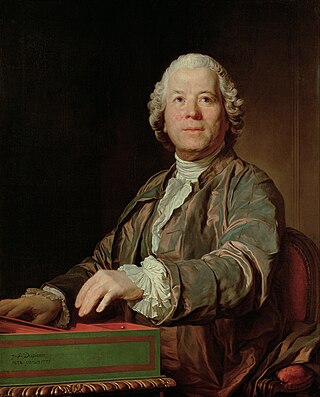
Christoph WillibaldGluck was a composer of Italian and French opera in the early classical period. Born in the Upper Palatinate and raised in Bohemia, both at the time part of the Holy Roman Empire, he gained prominence at the Habsburg court at Vienna. There he brought about the practical reform of opera's dramaturgical practices for which many intellectuals had been campaigning. With a series of radical new works in the 1760s, among them Orfeo ed Euridice and Alceste, he broke the stranglehold that Metastasian opera seria had enjoyed for much of the century. Gluck introduced more drama by using orchestral recitative and cutting the usually long da capo aria. His later operas have half the length of a typical baroque opera.
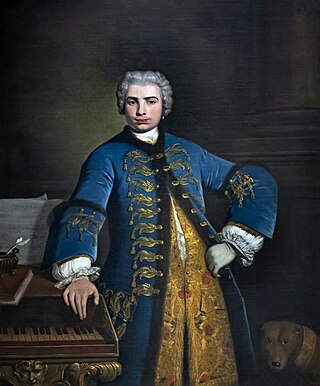
Farinelli was the stage name of Carlo Maria Michelangelo Nicola Broschi, a celebrated Italian castrato singer of the 18th century and one of the greatest singers in the history of opera. Farinelli has been described as having had soprano vocal range and as having sung the highest note customary at the time, C6.

Pauline Viardot was a French dramatic mezzo-soprano, composer and pedagogue of Spanish descent. Born Michelle Ferdinande Pauline García, she came from a musical family and took up music at a young age. She began performing as a teenager and had a long and illustrious career as a star performer.

Michael Kelly was an Irish tenor, composer and theatrical manager who made an international career of importance in musical history. One of the leading figures in British musical theatre around the turn of the nineteenth century, he was a close associate of playwright and poet Richard Brinsley Sheridan. He also became friends with musicians such as Mozart and Paisiello, and created roles for the operas of both composers. With his friend and fellow singer Nancy Storace, he was one of the first tenors of that era from Britain and Ireland to become famous in Italy and Austria. In Italy he was also known as O'Kelly or even Signor Ochelli. Although the primary source for his life is his Reminiscences, doubt has been cast on the reliability of his own account, and it has been said that '[a]ny statement of Kelly's is immediately suspect.'

Isabella Angela Colbran was a Spanish opera soprano and composer. She was known as the muse and first wife of composer Gioachino Rossini.

Caterina Cornaro ossia La Regina di Cipro is a tragedia lirica, or opera, in a prologue and two acts by Gaetano Donizetti. Giacomo Sacchero wrote the Italian libretto after Jules-Henri Vernoy de Saint-Georges' libretto for Halévy's La reine de Chypre (1841). It is based on the life of Caterina Cornaro, Queen of Cyprus from 1474 to 1489. It premiered at the Teatro San Carlo, Naples on 12 January 1844.
William Savage was an English composer, organist, and singer of the 18th century. He sang as a boy treble and alto, a countertenor, and as a bass. He is best remembered for his association with the composer George Frideric Handel, in whose oratorios Savage sang.
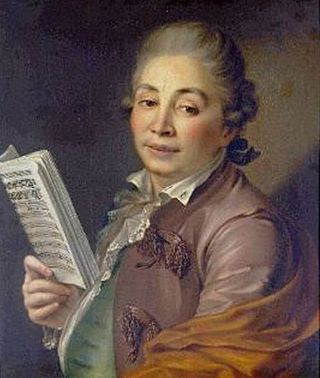
Vito Giuseppe Millico, called "Il Moscovita", was an Italian soprano castrato, composer, and music teacher of the 18th century who is best remembered for his performances in the operas of Christoph Willibald Gluck.

Leonora Baroni was an Italian singer, theorbist, lutenist, viol player, and composer.
Pietro Mingotti was an Italian impresario active across continental Europe. His brother, Angelo, formed an opera company in Prague around 1732, consisting of three male singers and five females; Pietro quickly followed suit, and the two troupes achieved European-wide success, sometimes performing together. Pietro's company, the more high-profile of the two, at times included Christoph Willibald Gluck and Giuseppe Sarti as members. Most of the works performed belonged to the genre of opera seria, though opere buffe were also given. Mezzo-soprano Maria Giustina Turcotti was a member of his company from 1746-1750.

Angelo Maria Amorevoli was a leading Italian tenor in Baroque opera.
Cecilia Young was one of the greatest English sopranos of the eighteenth century, the wife of composer Thomas Arne, and the mother of composer Michael Arne. According to the music historian Charles Burney, she had "a good natural voice and a fine shake [and] had been so well taught, that her style of singing was infinitely superior to that of any other English woman of her time". She was part of a well-known English family of musicians that included several professional singers and organists. Young enjoyed a large amount of success through her close association with George Frideric Handel. She appeared in several of his oratorios and operas including the premieres of Ariodante (1735), Alcina (1735), Alexander's Feast (1736) and Saul (1739).
Polly Young was an English soprano, composer and keyboard player. She was part of a well-known English family of musicians that included several professional singers and organists during the 17th and 18th centuries. Her husband, François-Hippolyte Barthélémon, was a composer and violinist, and their daughter, Cecilia Maria Barthélemon, was also a composer and opera singer.

Yelizaveta Andreyevna Lavrovskaya was a Russian mezzo-soprano praised for her dramatic performances of operatic arias and her sensitive interpretations of lieder.

Teresa Saporiti was an Italian operatic soprano and composer most remembered today for creating the role of Donna Anna in Mozart's opera Don Giovanni. She was born in Milan and died there at the age of 106. In her later years, she was often referred to by her married name, Teresa Saporiti-Codecasa.

Giulia Frasi was born c. 1730 and died in 1772 or after May 1774. She was an Italian soprano who was primarily active in London. She sang in every one of Handel's English oratorios, including various world premières for which the composer wrote roles specifically for her.

Manuel del Pópulo Vicente Rodriguez García was a Spanish opera singer, composer, impresario, and singing teacher. He is often credited as a key figure in the development of modern vocal technique and vocal pedagogy.
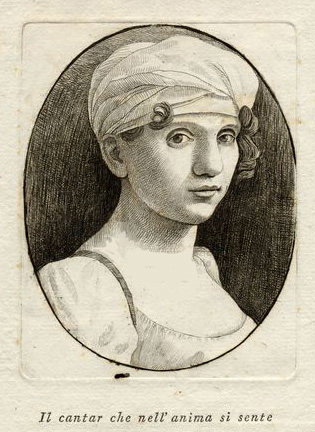
Elisabetta Manfredini-Guarmani was an Italian opera singer best known for having created the leading soprano roles in four of Rossini's operas, roles which he wrote specifically for her voice. She was born Antonia Elisabetta Manfredini in Bologna and was the daughter of the composer and music theorist Vincenzo Manfredini. After her stage debut in 1810 when she sang in the premiere of Stefano Pavesi's Il trionfo di Gedeone at Bologna's Teatro del Corso, she went on to perform at La Fenice, La Scala, Teatro Regio di Torino, Rome's Teatro Argentina and several other opera houses, primarily in Northern Italy. In addition to the roles she created in Rossini's operas, she also sang in the world premieres of operas by several composers who are lesser known today, including Pietro Raimondi, Simon Mayr, and Ferdinando Paër. Her last known appearance was in 1828 after which there is no further trace of her. The date and place of her death are unknown.
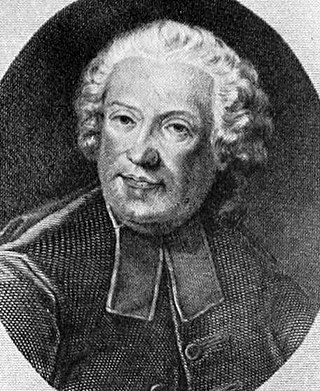
L'impresario delle Isole Canarie, also known as L'impresario delle Canarie or Dorina e Nibbio, is a satirical opera intermezzo libretto attributed to Metastasio, written in 1724 to be performed between the acts of Metastasio's opera seria Didone abbandonata. The first performance of the work was on February 1, 1724, in Naples, Italy, at Teatro San Bartolomeo. The first composer to set this libretto to music was Domenico Sarro, also known by the name Sarri, who also revised the work in 1730. The role of Dorina was first sung by the contralto Santa Marchesini, and Nibbio by the basso buffo singer Gioacchino Corrado. Later versions of this libretto appear with the titles L'impresario, L'impresario e la cantante and others.
Francesco Vanneschi was an Italian opera manager, director and librettist; his death date is usually given as 1759, but he was still alive and working at the King's Theatre in April 1760. He was known as having been active as a librettist in Florence in 1732 when he wrote Enrico and in 1741 was appointed as a director and librettist for the King's Theatre in London.














